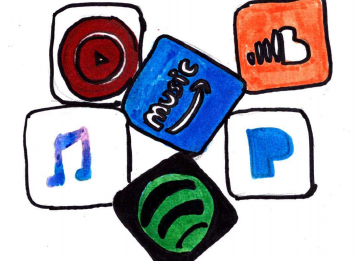Music streaming is making songs shorter, less enjoyable

Illustrated by Mimi Herrick
February 28, 2020
From record players to radios to walkmans to mp3 players, the methods that people have used to listen to their favorite songs have always been evolving. Lately, the most common way that people have been listening to music is by purchasing subscriptions on their phones to services that give them unlimited streams of available songs. Platforms like Spotify, Apple Music and Pandora have thrived off of these business models. In fact, the popularity of apps just like the ones mentioned has grown so immensely that evidence has surfaced of artists specifically designing songs to take advantage of their algorithms; the length of the average song has decreased from what it was a couple years ago. If this trend is to continue, it will lead to a music environment that is overall, worse.
According to data analysis on music streaming conducted by Quartz, the average length of each song that made an appearance on the Billboard Hot 100 fell from three minutes and 50 seconds to three minutes and 30 seconds between 2013 and 2018. Furthermore, six percent of songs to chart in 2018 were two minutes and 30 seconds or less as compared to only one percent in 2013.
“Personally, I didn’t realize songs were getting shorter, but it makes a lot of sense. It helps explain why a lot of recent songs seem to sound so similar to each other; they don’t last long enough to really stand out,” says sophomore Alex Krepsik.
As for 2019, numerous top ten hits from the year have fallen under the three minute mark, including Lizzo’s “Good as Hell,” and Ariana Grande’s “7 Rings.” Some 2019 songs even have run times at under two minutes. The song that will be remembered as defining the summer of 2019, breaking record after record after record, the original version of Lil Nas X’s “Old Town Road,” clocked in at just one minute and 53 seconds. All of the songs just mentioned were among 2019’s shortest and most popular. Knowing this, it would be reasonable to expect the average song length to only decrease further in the coming years.
While it is undeniable that this shift is occurring, how do we know that online music streaming is the reason for this change?
The answer lies in the economics of streaming apps. For each individual stream a song obtains, its creator is paid the same amount, no matter the duration. So in order to generate the most revenue, it does not matter how long a song is listened to, it just has to be listened to in full. This is noteworthy as in 2018, money generated from streaming services accounted for 75 percent of a song’s total revenue, according to Quartz. In order to capitalize off of this, it would be logical for artists to make shorter songs.
But even if music stars’ latest tracks are a bit shorter than they were compared to their previous work, that does not mean that the content of the song is inherently worse. However, it does mean that the experience of listening to it will not last as long.
Freshman Ben Levy describes this as being, “slightly irritating” because, “if you find a good song now,” there is a bigger chance that “it doesn’t last long.” He also says he would much prefer to listen to a five minute song than a two-and-a-half minute song twice.
Even if artists try to argue that a song’s length and quality have no correlation, it still stands that shorter music cannot provide listeners such as myself and Levy with as much satisfaction as longer songs can.
Moreover, Sophomore Raya Goulding recalls a time a few summers ago when she had a particularly memorable experience with a certain song.
“I was at camp and everyone danced to the same song everyday during warmups. It was just a lot of fun,” Goulding marvelled.
People who have had experiences with music like Goulding’s know just how unforgettable they can be. These moments can give people chills, or make them feel as if they are the center of the universe.Though, with shorter music becoming more common, less people will be able to have these experiences to the same degree as Goulding has had. Songs that don’t last as long just can’t provide people with the same joy. Their won’t be as significant a build up to the peak of the final chorus, or as many quotable lyrics to make these experiences something that people will remember and cherish.
Though plenty of people still frequently have experiences with music similar to Goulding’s, recent songs that have attempted to try and give more people this gratification have fallen flat of fulfilling that role. Take Taylor Swift’s “Me!” for instance. The song was supposed to be a return to the more upbeat poppy sound that brought her to superstardom as opposed to the darker, more sinister side that fans saw in Reputation. However, critics thought the song fell flat of its potential. Vulture went as far as saying the song was, “not the height of her formidable songwriting powers” in addition to calling the lyrics “simple.” This backlash among critics was so strong that Swift ended up removing an entire lyric from the song’s bridge when it came time to release the full album.
“Me!” is, “…not nearly as detailed or complex as the typical Taylor Swift story song,” junior and Taylor Swift fan Connie Harwood said.
It was not just critics who felt this way about the song, but even some of the most committed members of her fanbase.
Part of why critics and fans alike felt this way about “Me!” is because of how it was meticulously crafted with maximizing revenues from streaming services as a priority. This ultimately led to its content and length being sacrificed, which was done in an effort to satisfy an audience dominated by streamers. For example, the song begins immediately with lyrics. This was a design choice well suited for listeners who are likely to skip the track if it does not get them hooked immediately. Furthermore, the song’s chorus is extremely basic and repetitive, making it easy for people to almost completely memorize it after only a few listens. Again, streamers would appreciate this choice because when they are looking for new music to listen to, the catchiness of a song plays a huge role in whether or not they are going to add it to their libraries and playlists.
Although it may seem like these design choices do not adversely affect people’s experience with the song, that could not be further from the truth. Firstly, the lack of an intro leaves listeners unsure of what to expect from the piece as opposed to if it started with one. The lyrical content of the chorus also causes problems when the fact that it was written by Taylor Swift is brought into consideration. For those unfamiliar, Swift is an artist who plays a large part in writing every single one of her songs. She has been praised in the past for telling intricate stories through her lyrics. But when comparing the chorus of “Me!” to some of her previous works, the quality of the writing is so different that it does not seem like it was written by the same person. When an artist as talented as Taylor Swift is writing such phoned-in lyrics for her latest album’s lead single, there must be a driving force behind the shift that is bigger than herself; increased rates of music streaming is the most logical reason why.
“If somebody is packaging their music to fit into a runtime, they are not being a true artist. It dilutes their authenticity,” percussion teacher Dave Eisenreich says.
No matter what may make music stars want to compress their songs, music will always remain better with fewer restrictions in place during its creation. When a song’s length has to be sacrificed, the quality of its content will also decrease. Artists who take advantage of the properties of streaming services today ignore the fact that music is more than just what meets the ear. It has layers of depth and color to it that should be protected and upheld because people deserve to listen to the best music. In order to preserve this, people need to start holding artists accountable for making music that is a true reflection of their potential. Whether it is writing honest reviews of popular songs or simply skipping songs that they do not like, anything that can be done to protect the integrity of this art form is something that is worthwhile.




















